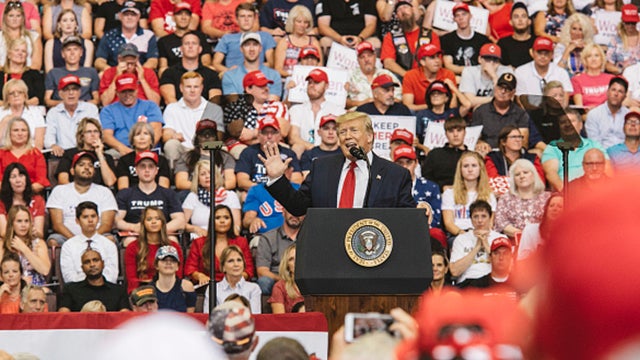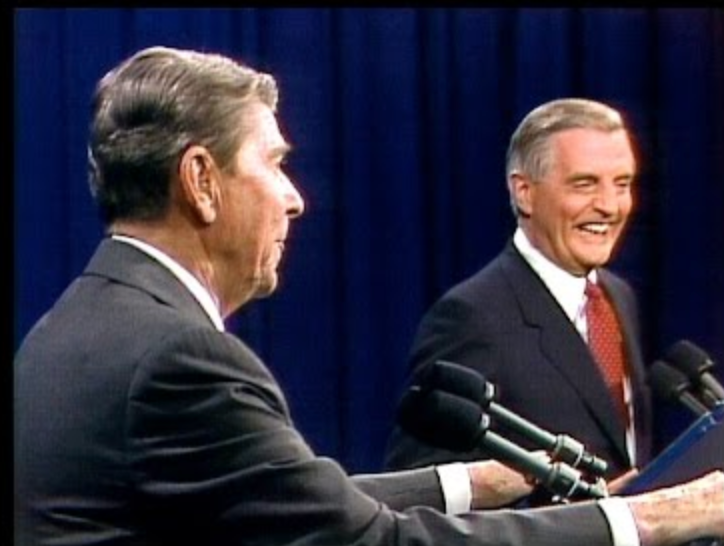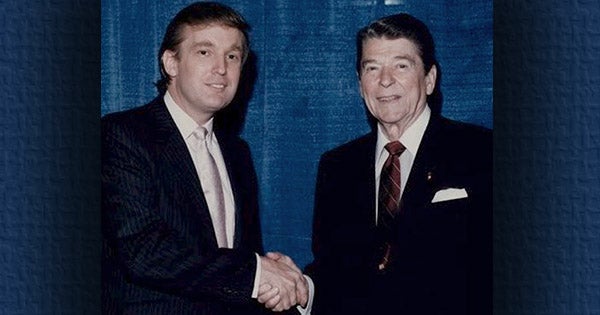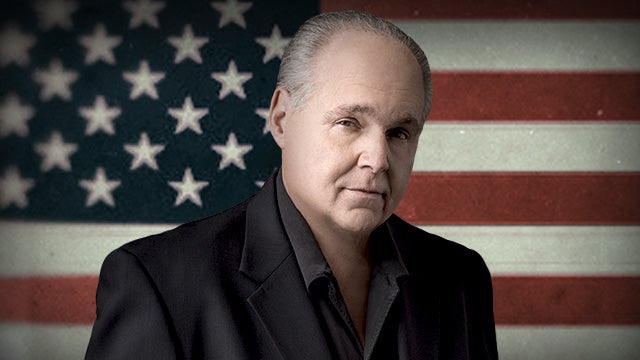RUSH: I have been saving this story for a while, too. This is a couple of days old now, and it ran… Where did it run? You know, this is one of these things that the website didn’t print. I don’t know where it was. It doesn’t matter. I know the guy. Gary Abernathy is the author, and he is a commentator of sorts in Hillsboro, Ohio. He’s, I guess, a student of media. He has written a piece that tries to explain why Trump is popular, how he got elected, how times in America have changed, particularly in media.
In that sense, it’s a very interesting piece because it does a great job here of tracing not just the media evolution, but the cultural evolution that has taken place. America is constantly changing. A lot of people have trouble adapting to change, but change is constant. People who have established habits and norms — and most people do, because it’s how they choose to live. People have the ability to live the way they want, establish norms and patterns, and they resist any change to it, particularly if the change requires some discomfort.
 But that doesn’t mask the fact that change is the name of the game for time. I mean, things are in constant flux and change, and whether people can adapt to it or not is often what is fascinating to observe. So let me share with you some pull quotes in this piece to see what you think. Mr. Abernathy — and I don’t know his political persuasions, so it’s not about this is left or right. It’s just one of these pieces that made me stop and consider it and think about it. So when that happens, I figure it’s worthwhile and I will share it with you.
But that doesn’t mask the fact that change is the name of the game for time. I mean, things are in constant flux and change, and whether people can adapt to it or not is often what is fascinating to observe. So let me share with you some pull quotes in this piece to see what you think. Mr. Abernathy — and I don’t know his political persuasions, so it’s not about this is left or right. It’s just one of these pieces that made me stop and consider it and think about it. So when that happens, I figure it’s worthwhile and I will share it with you.
He begins by writing, “I recently watched the 1980 presidential debate between incumbent Democrat Jimmy Carter and his Republican challenger, [Ronaldus Magnus].” By the way, the headline of this piece: “Trump Is the Product of a Narcissistic Media Age.” His point is Trump is not abnormal at all in terms of public preference, that Trump is exactly what media has become. So now that you know that, let me share with you even more.
“The debate” between Carter and Ronaldus Magnus “is striking in retrospect, not because of memorable zingers” that Reagan offered, but “because of a tone and tenor that today’s audiences and TV execs would find downright tedious” and would not permit. “The members of the media panel [in this 1980 debate] didn’t interrupt the candidates or inject themselves into the debate. The candidates didn’t talk over each other, and neither accused his opponent of being a racist, a Russian agent, an anti-Semite, a baby-killer, a communist or a liar.”
In one sense it was what everybody now thinks was civil. (paraphrased) “Civility reigned supreme!” What this misses… Well, I’ll hold that thought after I’ve read a little more to you. “At one point, after a Reagan critique, Carter responded, ‘Governor Reagan is making some very misleading and disturbing statements.’ Similarly, an allegation by Carter brought this [response] from Reagan: ‘The figures that the president has just used about California is a distortion of the situation there.’ That’s as nasty as it got,” those two lines.
“The journalists,” the moderators, they “didn’t dispute the answers or try to create memorable moments for themselves, instead respecting the public’s ability to decipher obfuscations,” to figure out what they were hearing, and the lies. They trusted public would not let either of these two guys get away with lying through his teeth. They trusted that. “Barbara Walters came closest to inserting herself into the fray when she observed, ‘I would like to say that neither candidate answered specifically the question of a specific policy for dealing with terrorism.’”
That was it! That was as far as the media went in characterizing what was happening in the debate. “[R]ather than badgering the candidates until she was satisfied, she understood that the event was not about her and moved on. It wasn’t that the political issues of [40 years] ago didn’t lend themselves to the theatrics we see today. Reagan’s proposals and gubernatorial record were regularly criticized as bad for minorities. Carter’s inability to free the hostages in Iran left him vulnerable to claims of weakness and, worse, he was once menaced by a rabbit.
“Carter could have called Reagan a ‘racist,’ and Reagan could have ridiculed ‘Little Jimmy’ to no end,” but none of that happened. “To understand why none of that happened [simply] requires us to recall the media world of 1980. The first 24-hour cable news channel, CNN, had debuted just a few months before the Carter-Reagan debate and was available [in 1980] in fewer than 2 million homes. There was no MSNBC and no Fox News.
 “There was no Internet, and, therefore, no hate-spewing blogs,” no social media, “no insulting memes, no disgusting tweets, and no fake, manipulated images capable of immediately reaching millions” of Americans. “But as cable TV and, later, digital platforms flourished, so did the need for revenue. What became evident was that Americans would tune in to watch a good fight, which brought us Crossfire on CNN and countless imitators on other channels pitting left vs. right, each one louder and more aggressive than the one before.
“There was no Internet, and, therefore, no hate-spewing blogs,” no social media, “no insulting memes, no disgusting tweets, and no fake, manipulated images capable of immediately reaching millions” of Americans. “But as cable TV and, later, digital platforms flourished, so did the need for revenue. What became evident was that Americans would tune in to watch a good fight, which brought us Crossfire on CNN and countless imitators on other channels pitting left vs. right, each one louder and more aggressive than the one before.
“Americans were encouraged to choose sides, driving us deeper into our partisan corners.” Now, I need to interject here to offer one slight observation. This picture that is being painted here by Mr. Abernathy is not entirely complete because I am here to tell you… His description of this debate may be accurate, but I am here to tell you that Ronald Reagan was despised by the media. He was hated. He was lied about. For those of you who weren’t alive in 1980 or you were too young to be paying attention, trust me.
Ronald Reagan got maybe 75% of what Donald Trump is getting. He was routinely mocked and laughed at and made fun of by a one-sided media. Now, the difference in the two is that Reagan laughed at them and did not enter into combat with them. He just laughed at them. Reagan had the ability to go over their heads. They could be televising a Reagan press conference, and they could be as mean-spirited as they are to Trump — and they were. Reagan had the ability to reach through that TV camera and speak directly to the American people.
So the media’s characterizing of Reagan failed because of the strength of his charisma, his communicative skills, and his likability. But don’t believe that it was idyllic and fair and a different media landscape, because it wasn’t. Especially as the Reagan presidency began and the tax cut plan back immersed in the Iran-Contra thing happened, and Reagan refusing to meet with Russian Soviet leaders. They despised the man, folks, and the coverage Reagan got was brutal. It got worse as he wins 45 states once and 49 states in again.
They despised the guy, and they did not hold it back or hide it. (sigh) Sam Donaldson was — I don’t know — the Jim Sciutto of the day or what’s his name, Jim…? What’s this…? (interruption) Jim Acosta. See? We forgot who he is ’cause Trump has kept him off TV now for over a year. I had to stop and think, “Who’s that lamebrain at CNN?” Jim Acosta. Well, Sam Donaldson was the Jim Acosta of his day with Reagan. Dan Rather was the Jim Acosta of his day with Nixon. So I just have to throw this in.
It was not (sniveling) all idyllic, everybody respecting one another, total civility all the time, and the Democrats didn’t get anywhere near their share of the same treatment. “On the entertainment side…” Back to the piece now. “On the entertainment side, television struck gold with ‘reality’ programming, placing seemingly ordinary citizens in voyeuristic and titillating settings, asking viewers to cheer one contestant, jeer the other and cast their votes. Out of this divisive and salacious swamp climbed the combative, shocking and polarizing Donald Trump, stepping onto a cultural stage constructed almost specifically for him.
“The billionaire businessman’s years of self-promotion and pervasive tabloid presence culminated in his stint as ringmaster of The Apprentice, one of the most popular reality shows of all time. As a candidate and president, against a sea of traditional politicians still practicing the old proprieties, Trump flourishes because he says and does that which fits perfectly within the gaudy landscape created by our modern news and entertainment media. He is the political pioneer of” what Mr. Abernathy called here “the Narcissistic Age,” capital N, capital A.
 “He cannot be too outrageous, because shocking and offensive are spoon-fed to America as the norm [today], courtesy of both unscripted and scripted television, which grows bolder with every new series in portraying what was once taboo language and scandalous behavior,” and it’s true. This is what I mean. There’s rampant change. People have to adapt to it. There are words I hear other people say on TV all day and I will not say ’em. There are words I hear other people on radio say to express that you’re mad. I still won’t. I don’t know why. I just won’t do it.
“He cannot be too outrageous, because shocking and offensive are spoon-fed to America as the norm [today], courtesy of both unscripted and scripted television, which grows bolder with every new series in portraying what was once taboo language and scandalous behavior,” and it’s true. This is what I mean. There’s rampant change. People have to adapt to it. There are words I hear other people say on TV all day and I will not say ’em. There are words I hear other people on radio say to express that you’re mad. I still won’t. I don’t know why. I just won’t do it.
To me, it’s like letting go of a standard. There’s no reason to say the P-word when I can just as easy say I’m mad or angry or what have you. But it’s commonplace now. And that’s mild compared to some of the other words, but it’s not that the words were “Seven Words You Can Never Say on Television.” It’s just a matter of class and dignity, I think. If you can say something without resorting to some vulgarity, why use the vulgarity. (Unless you need to to stand out.) Now here’s the penultimate point:
“Pundits wonder why millions of Americans aren’t shocked by Trump. The shouting demagogues on cable news who bemoan our polarized politics and our lowered standards, and the producers and entertainers in Hollywood who curse his name, should come to terms with the fact that Trump is the progeny of their own talents,” their own work, their attempts, “and efforts.” They created the stomping ground that gave us Donald Trump. Why in the hell are they surprised by it?
“Issues won’t decide the 2020 election. In presidential years…” This is the writer, not me, Gary Abernathy, Hillsboro, Ohio. “Issues won’t decide the 2020 election. In presidential years, millions of ballots are cast by Americans who are ambivalent about politics and hang up on pollsters but who get pushed to the polls by the get-out-the-vote machines. When uninterested citizens feel compelled to vote next year, which candidate will once again be most comfortable and familiar to them based on their daily media intake?”
It’s hands down Donald Trump. It ain’t gonna be Sleepy Joe. It ain’t gonna be Kamala Harris. It ain’t gonna be Cory Booker. It ain’t gonna be any of these people wringing their hands, all upset about what’s happened to our civility. Donald Trump is popular for one reason, or many reasons, and there’s nothing that’s changed in that regard. “After watching a recent Trump rally, a friend who cares little about politics smiled and said, ‘You have to hand it to [Trump]. He’s entertaining.’ Chalk up another vote for Trump.”
That’s Gary Abernathy. I wish I could remember where this ran. You know, I use the Reader format. It doesn’t print the link, and I know that. I just forgot to add it. It’s my bad. “Trump Is the Product of a Narcissistic Media Age.” It’s not an anti-Trump thing. If anything, it’s a sad commentary on the state of media in America and what it has produced, and it is kind of interesting. These guys are all shocked and outraged over Trump’s tweeting and his outrageous statements — and yet they’re the ones that brought us all this, when you get right down to it.
BREAK TRANSCRIPT
RUSH: Here’s Joe, Charlotte, North Carolina. Glad you waited, sir. Welcome.
 CALLER: Thanks, Rush. Great to talk to you. I’ve been listening to you since I graduated college back in 1989. And the point you made earlier about the media being the reason we have Trump, the one thing I think you’re missing is you’re really the reason we have Trump. And I don’t mean that in a negative way. I mean it in a complimentary way.
CALLER: Thanks, Rush. Great to talk to you. I’ve been listening to you since I graduated college back in 1989. And the point you made earlier about the media being the reason we have Trump, the one thing I think you’re missing is you’re really the reason we have Trump. And I don’t mean that in a negative way. I mean it in a complimentary way.
The fact that you were the first person to really step up and give conservatives a voice was huge because the longer you were on the air, the more people became bold about our opinions. And being who they are, liberals coming out of that sixties entitled generation, the liberals became just crazy, and they amp up the negativity. It’s why the media does what they do because they couldn’t debate us, they couldn’t have a discussion with us. They had to freak out and do —
RUSH: That’s exactly — they have to shut us up out there, Joe. They can’t engage us. They have to call us names or somehow discredit us or what have you. Well, I really do appreciate your saying that. I could go the humble route and say, “No ho-ho-ho, I had nothing to do with it,” but that’d all be a lie, and you’d know it.
I know Donald Trump. I know how to explain Donald Trump to people. And I think that is important and was in having a lot of people that were curious and maybe a little nervous have a little better understanding.


